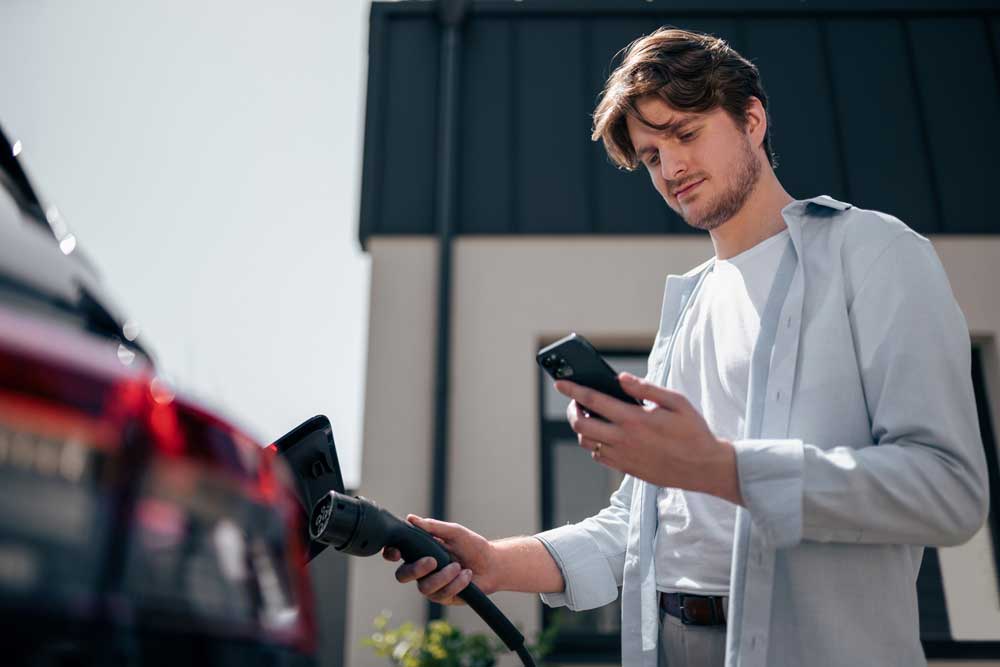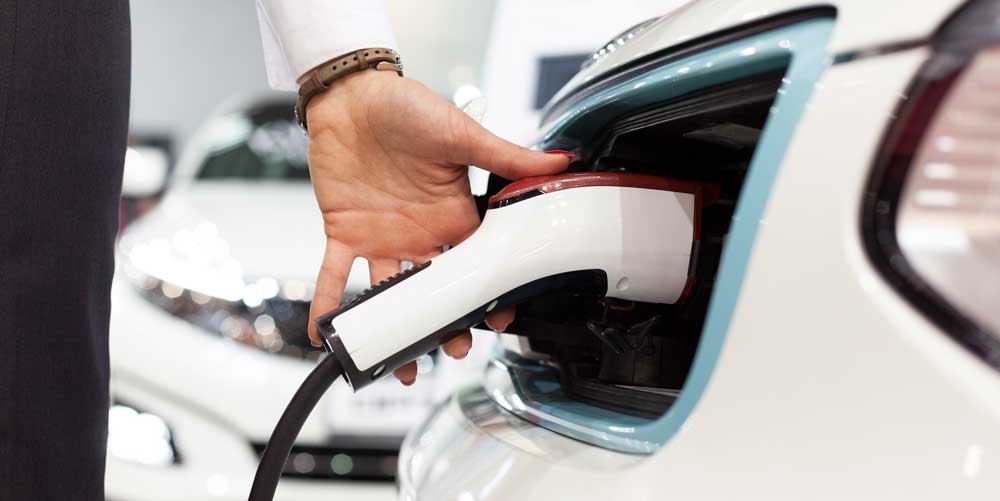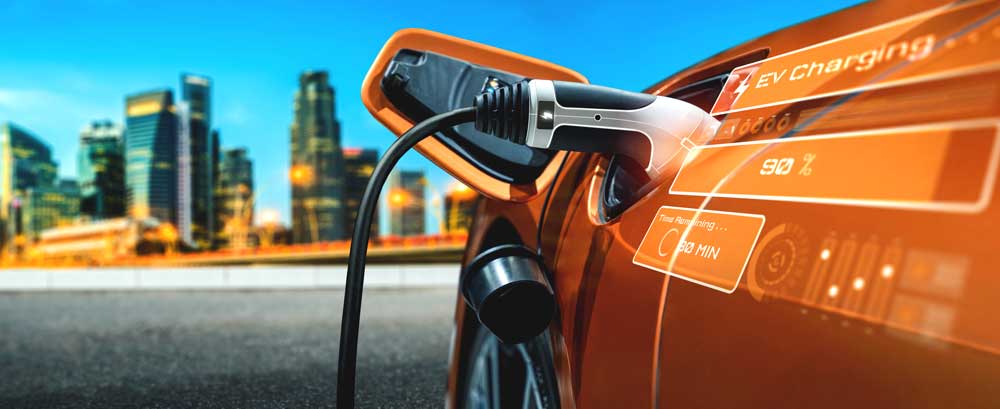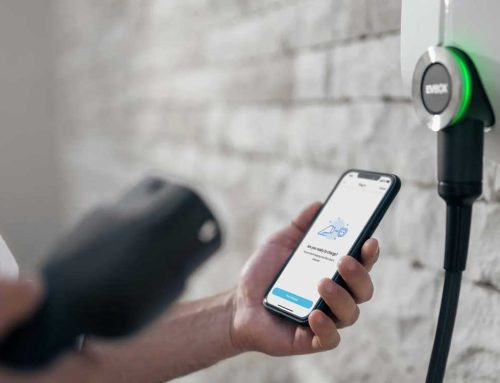Table of Contents
EV Home Charging – Electric vehicles (EVs) have been gaining popularity in recent years, thanks to their environmental benefits and cost savings over traditional fossil fuel-powered vehicles. One of the key factors that has been holding back wider adoption of EVs is the lack of convenient and reliable home charging options. Currently, most EV owners charge their vehicles overnight using level 1 or level 2 charging equipment, which can take several hours to fully charge a battery.
However, the next 5 years are expected to bring significant advancements in EV home charging technology and infrastructure, which will play a crucial role in the continued growth of the EV market. The advancements in charging technology, expansion of charging infrastructure and role of smart grid technology will be the key area to watch for in the next five years. These trends will make it easier and more convenient for EV owners to charge their vehicles at home, and will also help to alleviate concerns about range anxiety and charging availability on long road trips. (More info on – How Much Does It Cost To Charge An EV ?)
Advancements in Charging Technology
One of the most exciting trends to watch for in the next 5 years is the advancement of charging technology. One such new and emerging technology is wireless charging. This technology allows EV owners to charge their vehicles by simply parking them over a wireless charging pad, without the need for plugging in a cord. This can greatly increase convenience, especially for EV owners who struggle with limited mobility or who have difficulty reaching the charging port on their vehicle.
Another new and emerging technology is high-power charging. This technology allows EV owners to charge their vehicles much faster than traditional level 1 and level 2 charging equipment. High-power charging stations, also known as fast-charging stations, can charge an EV battery to 80% in as little as 20-30 minutes. This can greatly reduce the time EV owners need to spend waiting for their vehicles to charge, and can help to alleviate range anxiety. (More info on – EV Charging Station Contractors – 8 Important Factors to Consider When Hiring)
While these new and emerging technologies have many benefits, there are also potential challenges and obstacles for widespread adoption. For example, wireless charging technology is still in the early stages of development and may take some time to become widely available. High-power charging stations are also relatively expensive to install and maintain, which may be a barrier for some cities and communities. Additionally, there are concerns about the impact of high-power charging on the power grid and the need for upgrading grid infrastructure to support it.

Expansion of Charging Infrastructure
Currently, EV charging infrastructure is relatively limited, with most EV owners charging their vehicles overnight at home using level 1 or level 2 charging equipment. Level 1 charging equipment is typically a 120-volt outlet, which can charge an EV battery in 8-12 hours. Level 2 charging equipment is a 240-volt outlet, which can charge an EV battery in 4-6 hours. Level 3 charging, also known as fast-charging, offers the quickest charging option with 80% charge in 20-30 minutes.
However, in order to support the continued growth of the EV market, there needs to be a significant expansion of charging infrastructure. Governments and private companies are taking initiatives to increase charging infrastructure by installing EV public charging stations in cities and along highways, as well as offering incentives for home charging equipment installation.
While these initiatives are promising, there are also potential challenges and obstacles for widespread expansion of charging infrastructure. For example, the installation and maintenance of charging stations can be costly and may be a barrier for some cities and communities. Additionally, there may be challenges in coordinating and standardising charging infrastructure across different regions. Furthermore, there is a need for upgrading the grid infrastructure to support the high-power fast charging stations and to avoid overloading the grid.
Role of Smart Grid Technology
A “smart grid” refers to a modernized power grid that uses advanced technology to improve the efficiency, reliability, and sustainability of the energy system. Smart grid technology can play a crucial role in the widespread adoption of EVs by enabling the integration of renewable energy sources, demand response, and energy storage.
One of the key developments in smart grid technology that relates to EV charging is grid integration. This involves using advanced technology to connect and coordinate the various components of the grid, including power generators, transmission and distribution lines, and energy storage systems. This can help to ensure a reliable and stable power supply for EV charging, even during periods of high demand.
Another development in smart grid technology that relates to EV charging is demand response. This involves using advanced technology to adjust the demand for energy in real-time, based on factors such as the availability of renewable energy sources and the capacity of the power grid. This can help to reduce the strain on the power grid during periods of high demand and can also lead to reduced costs for EV owners.
The potential benefits of smart grid technology for EV charging are many, including improved energy efficiency, reduced costs, and increased reliability. Smart grid technology can help to ensure that EV charging is done in a way that is compatible with the power grid and that maximizes the use of renewable energy sources. Additionally, smart grid technology can help to reduce costs for EV owners by enabling them to charge their vehicles during off-peak hours when electricity prices are lower.
Impact on the Grid and Energy Industry
As the adoption of EVs continues to grow, it is important to consider the potential impact on the power grid and energy industry. With more EVs on the road and more charging infrastructure being installed, there will be increased demand for electricity, particularly during peak hours. This could lead to increased strain on the power grid and may require significant investments in grid infrastructure and upgrades.
Additionally, the increased demand for electricity could also lead to higher costs for utilities and energy companies. This could be mitigated by implementing smart grid technology and demand response strategies, as well as by encouraging EV owners to charge their vehicles during off-peak hours when electricity prices are lower.
The government and private sector will play a crucial role in addressing these challenges and opportunities. Governments can provide financial incentives and regulations to encourage the expansion of charging infrastructure and the use of smart grid technology. Additionally, governments can work with utilities and energy companies to ensure that the power grid is able to handle the increased demand for electricity. On the other hand, private companies can invest in research and development of new charging technologies and infrastructure, as well as in energy storage and renewable energy sources to support EV charging.
The next 5 years will see significant advancements in EV home charging technology and infrastructure, which will play a crucial role in the continued growth of the EV market. Advancements in charging technology such as wireless charging and high-power charging will increase convenience and reduce charging times. The expansion of charging infrastructure, including government and private initiatives, will make charging more accessible. The integration of smart grid technology will improve energy efficiency, reduce costs, and increase reliability.
These trends are important for the continued growth of the EV market, as they will make it more convenient and less expensive for EV owners to charge their vehicles at home. They will also help to alleviate concerns about range anxiety and charging availability on long road trips. Additionally, these trends will support the transition to a more sustainable energy future by enabling the integration of renewable energy sources and reducing the strain on the power grid. It is important for the Government and private sector to work together to address the challenges and opportunities presented by these trends, in order to ensure that EV adoption continues to grow in a sustainable and efficient way.

EV Home Charging – Frequently Asked Questions
Can I install an EV charger at home?
Yes, you can install an EV charger at home. There are various options available for home EV charging, including level 1, level 2, and level 3 charging equipment. It’s important to consider factors such as cost, convenience, and power requirements when choosing a home EV charger.
Should I charge my EV to 100% at home?
It is generally not recommended to charge your EV to 100% at home. Most EV manufacturers recommend charging to 80-90% to help prolong the battery’s lifespan. However, it is also important to check your vehicle’s owner’s manual for specific charging guidelines.
Can I charge my EV from a house socket?
It is possible to charge an EV from a house socket, also known as level 1 charging, but it is not the most efficient way to charge. Level 1 charging typically uses a 120-volt outlet and can take 8-12 hours to fully charge an EV battery. It is recommended to use level 2 charging equipment, which uses a 240-volt outlet and can charge an EV battery in 4-6 hours.
Which is the best home electric car charger?
The best electric car home charger will vary depending on individual needs and preferences. It’s important to consider factors such as cost, convenience, and power requirements when choosing a home car charger. Some popular options include the Myenergi Zappi, the EVBox Elvi Smart Charger, and the EO Charger. It is also recommended to consult with a professional electrician or EV expert before making a decision.
What is the difference between 7kW and 22kW EV charger?
The difference between 7kW and 22kW EV chargers is the rate at which they charge an EV battery. A 7kW charger will charge an EV battery at a slower rate than a 22kW charger. A 22kW charger can charge an EV battery up to 80% in around 4 hours, while a 7kW charger can charge an EV battery up to 80% in around 8 hours.
Is it better to hardwire or plug-in EV charger?
It depends on personal preference and the specific needs of your home charging setup. A hardwired EV charger is permanently installed and does not require a plug, while a plug-in EV charger can be easily unplugged and moved to another location. Hardwired EV chargers may be more expensive to install but offer a more permanent and secure charging solution, while plug-in EV chargers may be more convenient and easier to install.
Should I plug in my EV every night?
It’s a good idea to plug in your EV every night, as long as you have access to a charging source. This will ensure that your EV is fully charged and ready to go in the morning. However, it’s also important to follow the specific charging guidelines provided by the vehicle’s manufacturer to ensure optimal battery performance and longevity.
Should I plug in my EV every day?
It depends on your daily usage and driving habits. If you are using your EV for daily commutes and short trips, then it may be beneficial to plug in your EV every day to maintain a consistent level of charge. However, if you only use your EV occasionally or for longer trips, then it may not be necessary to plug in your EV every day.
Does slow charging damage EV battery?
Slow charging an EV battery should not damage the battery, as long as the charging is done within the guidelines provided by the vehicle’s manufacturer. However, slow charging can take longer to fully charge the battery and may not be as efficient as faster charging methods.
Do electric cars lose charge if not driven?
Yes, electric cars do lose charge if not driven. The amount of charge loss will depend on factors such as temperature, age of the battery, and the specific vehicle model. It’s important to keep an eye on the battery level and to plug in the EV to charge as needed.
Is it better to fast charge or slow charge?
It depends on the specific needs and preferences of the EV owner. Fast charging can quickly charge the EV battery to a high percentage in a short amount of time, which can be useful for long-distance travel or for those who are short on time. Slow charging, on the other hand, can take longer but is often more convenient for everyday use and for those who have access to charging for an extended period of time. Additionally, fast charging can have a greater impact on the battery’s lifespan in the long term, so it is important to also consider the battery’s health and longevity when choosing between fast charging and slow charging.
Should I drain my EV battery before charging?
It is not necessary to drain your EV battery before charging. In fact, it’s recommended to keep your EV battery at a consistent level of charge to prolong the battery’s lifespan. However, it’s important to follow the specific charging guidelines provided by the vehicle’s manufacturer to ensure optimal battery performance and longevity.
Does frequent charging damage EV battery?
Frequent charging should not damage an EV battery as long as the charging is done within the guidelines provided by the vehicle’s manufacturer. However, it’s important to keep an eye on the battery’s health and to avoid overcharging the battery.
What is the lifespan of an electric car?
The lifespan of an electric car can vary depending on factors such as usage, maintenance, and the specific vehicle model. However, most EV manufacturers estimate a lifespan of around 8-10 years for the battery and up to 15 years for the overall vehicle.
Can I unplug my EV while charging?
It’s not recommended to unplug your EV while charging, as this can disrupt the charging process and may cause damage to the battery or charging equipment. It’s best to wait until the charging is complete before unplugging your EV.
Related search terms: home charger for electric car, home car charger Ireland, ESB home car charger, EV home charger cost, electric Ireland EV charger, best home EV charger Ireland, best electric car home charger, EV home charger Ireland cost, SEAI EV charger grant
Ever wondered about EV Charging Connector Types. Check out our latest blog post for details. Read our latest blog post for details



